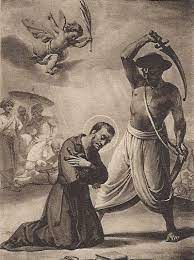Joaquim Magalhães de Castro
By maintaining a low profile, João de Brito managed to work for several months in the Maravá territory. Thousands of people flocked to receive the sacraments and conversions spread to the higher castes. The priest’s presence thus became increasingly uncomfortable for the local authorities.
As he continued his activity, João still hoped to gain an audience with Raghunatha Deva, the Sethupathi. However, before achieving this, there was the conversion of a prince who until then had been violently opposed to the spread of Christianity. He was a direct vassal of Raghunatha Deva. His Baptism was too blatant a provocation to the ruler, but João administered the sacrament to him on January 6, 1693. Now a Christian, Prince Tadiya Thevan disowned three of his four wives. One of them was the Sethupathi’s niece.
Two days later, the Jesuit was arrested. His most faithful friends devised some escape plans, but João de Brito refused them. He was in a dilemma similar to which many future martyrs would find themselves: if they flee, they are cowards; if they stay, they are risking their own lives. Brito stayed, because he was convinced in the Holy Spirit that he should stay; and, humanly speaking, his flight would have been a scandal to the Christians whom he left to face persecution alone. His trial took place on the 28th of January, but it was mere pro forma and the death sentence was announced. They then transferred him, amid numerous mistreatments, to Oriur, where he received martyrdom by beheading on February 4, 1693.
Until his last breath, João de Brito was always an example of Christian faith. Walking calmly to the place of execution, he continued to live the gospel, and when facing the executioner he was sure that “if anyone keeps my word he will never see death again” (Jn 8:51).


 Follow
Follow


